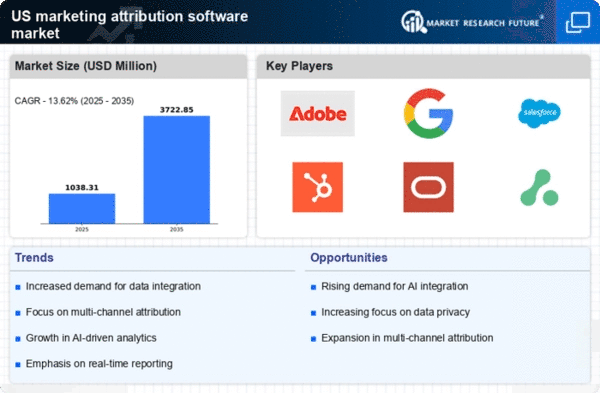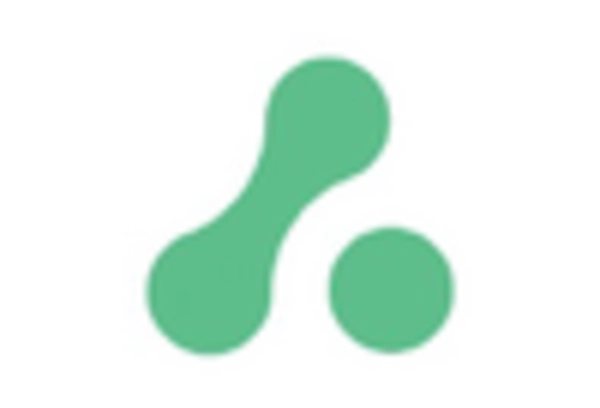Increased Focus on Customer Experience
In the current landscape, the marketing attribution-software market is significantly influenced by the heightened emphasis on customer experience. Companies are increasingly aware that delivering a seamless and personalized experience is crucial for retaining customers and driving sales. Research indicates that organizations prioritizing customer experience can achieve up to a 60% increase in customer loyalty. As a result, businesses are turning to marketing attribution software to gain insights into customer behavior and preferences. This software enables marketers to tailor their strategies to meet the specific needs of their audience, ultimately enhancing customer satisfaction. The growing recognition of the importance of customer experience is likely to propel the marketing attribution-software market forward, as companies invest in tools that facilitate a deeper understanding of their customers.
Rising Demand for Data-Driven Insights
The marketing attribution-software market is experiencing a notable surge in demand for data-driven insights. Businesses are increasingly recognizing the value of leveraging data analytics to optimize marketing strategies. In 2025, it is estimated that companies will allocate approximately 30% of their marketing budgets towards data analytics tools. This shift is driven by the need for precise measurement of marketing effectiveness and return on investment (ROI). As organizations strive to enhance customer engagement and conversion rates, the adoption of marketing attribution software becomes essential. The ability to track customer journeys across various channels allows marketers to make informed decisions, thereby improving overall campaign performance. Consequently, the marketing attribution-software market is poised for substantial growth as businesses seek to harness the power of data to drive their marketing efforts.
Expansion of Digital Marketing Channels
The marketing attribution-software market is being propelled by the rapid expansion of digital marketing channels. With the proliferation of social media, email marketing, and online advertising, businesses are increasingly challenged to track and measure the effectiveness of their marketing efforts across multiple platforms. In 2025, it is projected that digital advertising spending in the US will exceed $200 billion, underscoring the need for robust attribution solutions. Marketing attribution software provides the necessary tools to analyze performance across these diverse channels, enabling marketers to allocate resources more effectively. As companies seek to optimize their marketing strategies in an increasingly digital landscape, the demand for sophisticated attribution solutions is expected to rise, driving growth in the marketing attribution-software market.
Regulatory Compliance and Data Governance
The marketing attribution-software market is also shaped by the growing importance of regulatory compliance and data governance. As data privacy regulations become more stringent, businesses are compelled to adopt solutions that ensure compliance while effectively managing customer data. In 2025, it is anticipated that compliance-related expenditures will account for approximately 15% of total marketing budgets. Marketing attribution software plays a critical role in helping organizations navigate these complexities by providing transparent tracking and reporting capabilities. This not only aids in adhering to regulations but also builds trust with consumers. As companies prioritize data governance, the marketing attribution-software market is likely to see increased adoption of tools that facilitate compliance and responsible data usage.
Emergence of Advanced Analytics Capabilities
The marketing attribution-software market is witnessing a transformation due to the emergence of advanced analytics capabilities. As businesses seek to derive deeper insights from their marketing data, the integration of advanced analytics tools becomes increasingly vital. In 2025, it is projected that the market for advanced analytics solutions will grow at a CAGR of over 25%. This growth is driven by the need for predictive analytics, which allows marketers to anticipate customer behavior and optimize campaigns accordingly. Marketing attribution software equipped with advanced analytics features enables organizations to make data-driven decisions, enhancing their competitive edge. As the demand for sophisticated analytical capabilities continues to rise, the marketing attribution-software market is expected to expand significantly.
















